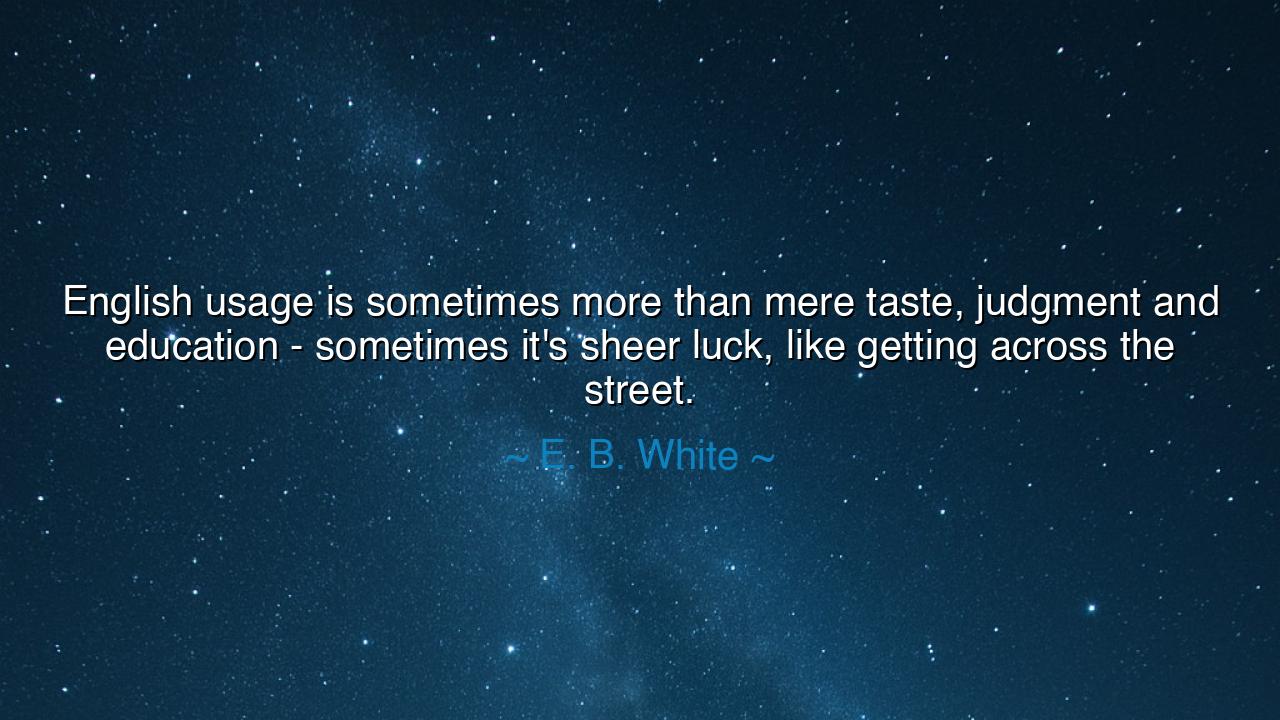
English usage is sometimes more than mere taste, judgment and
English usage is sometimes more than mere taste, judgment and education - sometimes it's sheer luck, like getting across the street.






“English usage is sometimes more than mere taste, judgment and education – sometimes it’s sheer luck, like getting across the street.” Thus spoke E. B. White, the master of prose and gentle humorist whose pen carried both grace and precision. In this wry yet profound observation, White reminds us that language, though guided by rules, is a living thing—an unpredictable force that flows and changes like the tide. He humbles the scholar and the grammarian alike, reminding us that even in the realm of intellect and art, chance often plays its part. To write or to speak well is not only a matter of discipline and knowledge—it is also a dance with fortune, a moment of alignment between thought, expression, and the mysterious rhythm of the world itself.
English usage, that ever-shifting art, cannot be tamed entirely by rules or mastery. One may study it with taste, refine it with judgment, and perfect it through education, yet still stumble into error—or brilliance—by accident. Language lives in motion, molded by culture, time, and the peculiarities of human nature. What was correct yesterday may seem quaint today; what was vulgar once may become noble. In this way, White compares linguistic success to crossing a street—a common act filled with unseen danger and random luck. One may look both ways, step carefully, and yet be undone by the unexpected. So too, in the realm of words, the careful writer may labor for perfection and still depend, in the end, upon a touch of grace.
E. B. White, who co-authored The Elements of Style—a cornerstone of modern writing—understood better than most the delicate balance between rule and rhythm. He revered clarity, brevity, and sincerity, yet knew that English, unlike mathematics, breathes with the irregular pulse of life. Its beauty lies not in its precision alone, but in its unpredictability—its capacity to surprise. The greatest stylists, he knew, were not those who obeyed every law of grammar, but those who dared to break them at the perfect moment. His own essays flowed like natural speech, filled with warmth, wit, and an almost musical balance between reason and spontaneity. His luck, as he humbly called it, was in knowing when to follow the rules—and when to let the language carry him beyond them.
Consider the story of William Shakespeare, whose mastery of English transformed the very soul of the language. Though he lacked a university education and formal instruction in style, he possessed something rarer—a gift for expression that defied convention. His plays and poems broke rules of grammar and syntax, coined new words, and reimagined old ones. He was not bound by the authority of education, but guided by the instinct of genius and, perhaps, by the luck of inspiration. The world’s greatest poet, then, stands as living proof of White’s claim: that mastery of English—or any art—is as much the product of intuition and fortune as it is of scholarship.
This truth humbles the proud and liberates the timid. For if even the greatest writers depend partly on luck, then all who struggle to find the right word or the perfect phrase are companions in the same uncertain journey. We strive for taste and judgment, yes, but we must also leave room for the unexpected—those moments when a phrase comes unbidden, when the muse whispers, when the hand moves faster than the mind. Language, like life, rewards the prepared spirit, but it also delights in surprising it. The wise writer learns to be both disciplined and open—to study the craft, but also to trust the current that flows beneath thought.
Yet beneath White’s humor lies a deeper wisdom. His comparison to “getting across the street” speaks not only of linguistic chance, but of the fragile beauty of human endeavor itself. Every act of creation—whether in words, music, or life—is a crossing between order and chaos, intention and accident. We can prepare ourselves with skill and caution, but there will always be an element beyond our control. The lesson is not to despair of this truth, but to embrace it—to accept that perfection is not demanded of us, only sincerity and effort. To write honestly, to speak clearly, to live fully—these are the true aims of education, even if chance sometimes governs the outcome.
Therefore, O seeker of expression, remember this: learn the rules of your craft, but do not become their prisoner. Study the language, refine your taste, and strengthen your judgment, yet leave space for the unpredictable grace that sometimes blesses the writer’s hand. Be humble before the vastness of expression, and laugh, as White did, at its chaos and charm. For to write well—or to live well—is much like crossing the street: one must look, step boldly, and trust that fortune will grant safe passage.
The lesson is clear: mastery is not the absence of uncertainty, but the courage to move through it. E. B. White teaches us that education, taste, and intellect are guides, but not guarantees. The true art lies in preparation joined with humility, skill joined with surrender. So write, speak, and live with care—and when luck grants you beauty, be grateful. For in the end, both the writer and the wanderer must step forward, trusting that though the path is uncertain, the journey itself is worth the risk.






AAdministratorAdministrator
Welcome, honored guests. Please leave a comment, we will respond soon